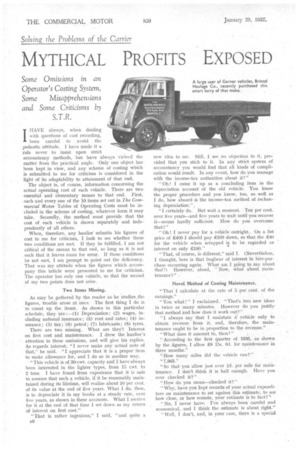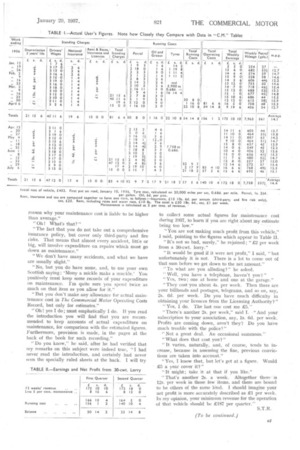Solving the Problems of the Carrier
Page 40

Page 41

If you've noticed an error in this article please click here to report it so we can fix it.
MYTHICAL PROFITS EXPOSED
II IAVE always, when dealing with questions of cost recording, been careful to avoid the pedantic attitude. I have made it a rule never to insist upon strict accountancy methods, but have always viewed the matter from the practical angle. Only one object has been kept in view, and any scheme of costing which is submitted to me for criticism is considered in the light of its adaptability to attainment of that end.
The object is, of course, information concerning the actual operating cost of each vehicle. There are two essential and 'elementary means to that end. First, . each and every one of the 10 items set out in The Commercial Motor Tables of Operating Costs musk be included in the scheme of costing, whatever form it may take. Secondly, the method must provide that the cost of each vehicle is shown separately and independently of all others.
When, therefore, any haulier submits his figures of cost to me for criticism, I look to see whether these two conditions are met. If they be fulfilled. I am not critical of the means to that end, so long as it is not such that it leaves room for error. If those conditions be not met, I am prompt to point out the deficiency. That was my attitude when the figures which accompany this b.rticle were presented to me for criticism. The operator has only one vehicle, so that the second of ray two points does not arise.
Two Items Missing.
As may be gathered by the reader as he studies .the figures, trouble arose at once. The first thing I do is to count up. the items. As shown in this particular schedule, they are (1) Depreciation; (2) wages, including national insurance ; (3) rent and rates; (4) insurance; (5) tax; (6) petrol; (7) lubricants; (8) tyres.
There are two missing. What are they? Interest on first cost and maintenance. I drew the haulier's attention to these omissions, and will give his replies. As regards interest, "I never snake any actual note of that," he said. "I appreciate that it is a proper item to make allowance for, and I do so in another way.
"This vehicle is of 30-cwt. capacity and I have always been interested in the lighter• types, from 15 cwt. to 2 tons. I have found from experience that it is safe to assume that such a vehicle, if it be reasonably maintained during its lifetime, will realize about 10 per cent. of its value at the end of five years. What I do, then, is to depreciate it in my books at a steady rate, over five-years, as shown in these accounts. What I receive for it at the end of that time I set down as my return of interest on first cost."
"That is rather ingenious," I said, "and quite a 136 new idea to me. Still, I see no objection to it, provided that you stick to it. In any strict system of accountancy you would find that all kinds of complication would result. In any event, how do you manage with the income-tax authorities about it?"
"Oh! I enter it up as a concluding item in the depreciation account of the old vehicle. You know the proper procedure and you know, too, as well as I do, how absurd is the income-tax method of reckoning depreciation.", "I certainly do. But wait a moment. Ten per cent. over five years—and five years to wait until you recover it—seems hardly sufficient. How do you overcome that?"
" Oh I I never pay for a vehicle outright. On a list price of ,400 I should pay £1.00 down, so that the £40 for the vehicle when scrapped is to be regarded as interest on only 2100."
"That, of course, is different," said I. (Nevertheless, thought, •here is that bugbear of interest in hire-purchase occurring again. What am I going to say about that?) However, aloud, "Now, what about maintenance?" .
Novel Method of Costing Maintenance.
"That I calculate at the rate of 5 per cent, of the earnings."
You what ! " I exclaimed. "That's two new ideas in twice as many minutes. However do you justify that method and how does it work out?"
"I always say that I maintaina." vehicle only to obtain revenue from it, and, therefore, the maintenance ought to be in proportion to the revenue."
"What does it amount to, then?" .
"According to the first quarter of 1936, as shown by the figures, I allow RS 1.5s. 6d. for maintenance in three months."
"How many miles did the vehicle run?"
" 7,963."
"So that you allow just over id. per mile for maintenance. I don't think it Is half enough. Have you ever checked it?"
"How do you mean—checked it?"
"Why, have you kept records of your actual expenditure on maintenance to set against this estimate, to see how close, or how remote, your estimate is to fact?"
"No, I never have. I've 'always been careful and economical, and I think the estimate is about right."
"Well, I don't, and, in your case, there is a special
reason why your maintenance cost is liable to be higher than average."
Oh! What's that?"
"The fact that you do not take out a comprehensive insurance policy, but cover only third-party and fire risks. That means that almost every accident, little or big, will involve expenditure on repairs which must go down as maintenance."
"We don't have many accidents, and what we have are usually slight."
"No, but you do have some, and, to use your own Scottish saying: '-Mony a tnickle maks a muckle.' You positively must keep some records of your expenditure on maintenance. I'm quite sure you spend twice as much on that item as you allow for it."
"But you don't make any allowance for actual maintenance cost in The Commercial Motor Operating Costs Record, but only for estimates."
"Oh! yes I do ; most emphatically I do. If you read the introduction you will find that you are recommended to keep accounts of actual expenditure on maintenance., for comparison with the estimated figures. Furthermore, provision is made, in the pages at the back of the book for such recording."
"Do you know," he said, after he had verified that my remarks on this subject were indeed true, "I had never read the introduction, and certainly had never seen the specially ruled sheets at the back. I will try
to collect some actual figures for :maintenance cost during 1937, to learn if you are right about my estimate being too low."
"You are not making much profit from this vehicle," I said, pointing to the 'figures which appear in Table II.
"It's not so bad, surely," he rejoined; "£2 per week from a 30-cwt. lorry."
"It would be good if it were net profit," I said, "hut unfortunately it is not. There is a lot to come out of that sum before we get down to the net amount."
"To what are you alluding?" he asked.
"Well, you have a telephone, haven't you?" "Yes, two ; one at home and one at the garage."
"They cost you about 4s. per week. Then there are your billheads and postages, telegrams, and so on, say, 2s. 6c1. per week. Do you have much difficulty in obtaining your licences from the Licensing Authority?"
" Yes, I do. The last one cost me £5."
"There's another 2s. per week," said I. " And your subscription to your association, say, 1s. 6d. per week. Profits are coming down, aren't they? Do you have much trouble with the police?"
" Not a great deal. An occasional summons."
" What does that cost yon?"
"It varies, naturally, and, of course, tends to increase, because in assessing the fine, previous convictions are taken into account."
"Yes, I know that, but let's get at a figure. Would £5 a year cover it?"
"It might; take it at that if you like."
"That's another 2s. a week. Altogether there is Vs. per week in those few items, and there are bound to be others of the same kind. I should imagine your net profit is more accurately described as £1 per week. In my opinion, your minimum revenue for the operation of that vehicle should be E187 per quarter." S.T.R.




















































































